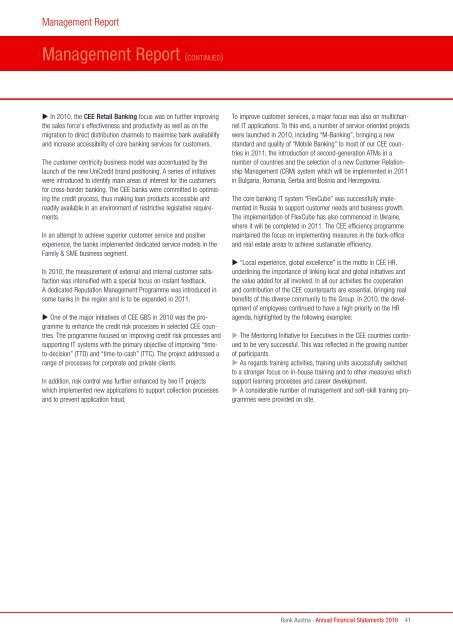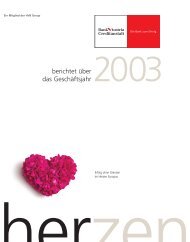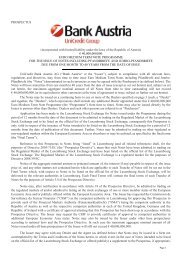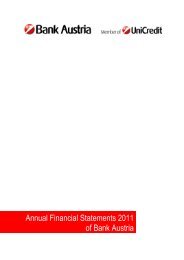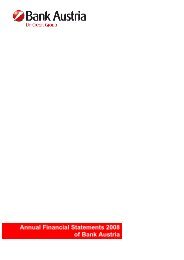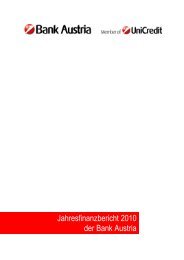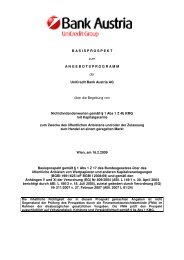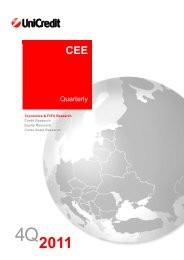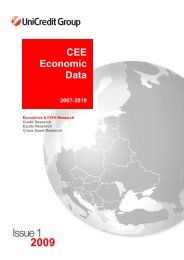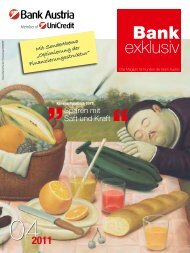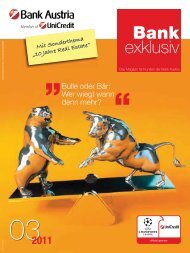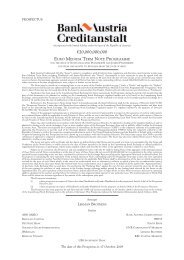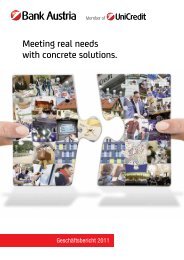Annual Financial Statements 2010 of Bank Austria
Annual Financial Statements 2010 of Bank Austria
Annual Financial Statements 2010 of Bank Austria
Create successful ePaper yourself
Turn your PDF publications into a flip-book with our unique Google optimized e-Paper software.
Management Report<br />
Management Report (CONTINUED)<br />
� In <strong>2010</strong>, the CEE retail <strong>Bank</strong>ing focus was on further improving<br />
the sales force’s effectiveness and productivity as well as on the<br />
migration to direct distribution channels to maximise bank availability<br />
and increase accessibility <strong>of</strong> core banking services for customers.<br />
The customer centricity business model was accentuated by the<br />
launch <strong>of</strong> the new UniCredit brand positioning. A series <strong>of</strong> initiatives<br />
were introduced to identify main areas <strong>of</strong> interest for the customers<br />
for cross-border banking. The CEE banks were committed to optimising<br />
the credit process, thus making loan products accessible and<br />
readily available in an environment <strong>of</strong> restrictive legislative requirements.<br />
In an attempt to achieve superior customer service and positive<br />
experience, the banks implemented dedicated service models in the<br />
Family & SME business segment.<br />
In <strong>2010</strong>, the measurement <strong>of</strong> external and internal customer satisfaction<br />
was intensified with a special focus on instant feedback.<br />
A dedicated Reputation Management Programme was introduced in<br />
some banks in the region and is to be expanded in 2011.<br />
� One <strong>of</strong> the major initiatives <strong>of</strong> CEE GBS in <strong>2010</strong> was the programme<br />
to enhance the credit risk processes in selected CEE countries.<br />
The programme focused on improving credit risk processes and<br />
supporting IT systems with the primary objective <strong>of</strong> improving “timeto-decision”<br />
(TTD) and “time-to-cash” (TTC). The project addressed a<br />
range <strong>of</strong> processes for corporate and private clients.<br />
In addition, risk control was further enhanced by two IT projects<br />
which implemented new applications to support collection processes<br />
and to prevent application fraud.<br />
To improve customer services, a major focus was also on multichannel<br />
IT applications. To this end, a number <strong>of</strong> service-oriented projects<br />
were launched in <strong>2010</strong>, including “M-<strong>Bank</strong>ing”, bringing a new<br />
standard and quality <strong>of</strong> “Mobile <strong>Bank</strong>ing” to most <strong>of</strong> our CEE countries<br />
in 2011, the introduction <strong>of</strong> second-generation ATMs in a<br />
number <strong>of</strong> countries and the selection <strong>of</strong> a new Customer Relationship<br />
Management (CRM) system which will be implemented in 2011<br />
in Bulgaria, Romania, Serbia and Bosnia and Herzegovina.<br />
The core banking IT system “FlexCube” was successfully implemented<br />
in Russia to support customer needs and business growth.<br />
The implementation <strong>of</strong> FlexCube has also commenced in Ukraine,<br />
where it will be completed in 2011. The CEE efficiency programme<br />
maintained the focus on implementing measures in the back-<strong>of</strong>fice<br />
and real estate areas to achieve sustainable efficiency.<br />
� “Local experience, global excellence” is the motto in CEE HR,<br />
underlining the importance <strong>of</strong> linking local and global initiatives and<br />
the value added for all involved. In all our activities the cooperation<br />
and contribution <strong>of</strong> the CEE counterparts are essential, bringing real<br />
benefits <strong>of</strong> this diverse community to the Group. In <strong>2010</strong>, the development<br />
<strong>of</strong> employees continued to have a high priority on the HR<br />
agenda, highlighted by the following examples:<br />
� The Mentoring Initiative for Executives in the CEE countries continued<br />
to be very successful. This was reflected in the growing number<br />
<strong>of</strong> participants.<br />
� As regards training activities, training units successfully switched<br />
to a stronger focus on in-house training and to other measures which<br />
support learning processes and career development.<br />
� A considerable number <strong>of</strong> management and s<strong>of</strong>t-skill training programmes<br />
were provided on site.<br />
<strong>Bank</strong> <strong>Austria</strong> · <strong>Annual</strong> <strong>Financial</strong> <strong>Statements</strong> <strong>2010</strong><br />
41


